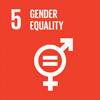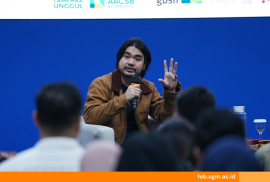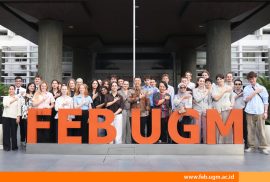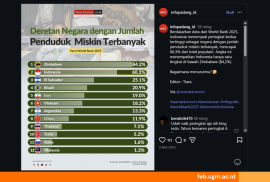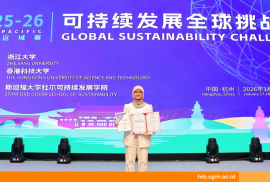
Thin smoke rose from a large pan filled with thick brown sugar syrup. Some international students tried stirring it, then tasted a piece of freshly made palm sugar. Surprised expressions quickly appeared as their tongues caught the unexpected spicy sensation of ginger from the gula jawa jahe produced by a traditional coconut sugar factory called Gubuk Kopi, in Karangrejo Village, Magelang, Central Java.
This experience was one of the memorable moments for 38 international students who joined the Cultural Immersion Day (CID) on August 13, 2025. They are students from various countries who will begin their studies at the Faculty of Economics and Business, Universitas Gadjah Mada (FEB UGM) in the first semester of the 2025/2026 academic year. The CID aims to introduce Indonesian culture more closely.
Earlier, the students participated in an outbound activity at Girli Cafe Resto, Magelang. The activity was filled with Indonesia-themed games, culminating in a team-based strategy challenge.
Afterwards, the students enthusiastically hopped into Volkswagen safari cars heading to Balkondes Borobudur. The journey through main roads, rice fields, and rural landscapes made the experience even more special.
Their first destination was Tingal Art Batik, Borobudur, where they learned batik-making and explored batik fabrics. Some students looked skillful in drawing hot wax on patterned white cloth, while others found it challenging since it was their first time. At the end of the canting session, they proudly showcased their creations and captured the moment as a keepsake.
The trip continued to a nearby local MSME, Regginan Bu Yatin. There, they observed the process of making rengginan from start to finish. Some students even had the chance to shape the rice crackers into round forms.
Patrick Groffner, a student from Reutlingen University, Germany, shared that it was his first time tasting rengginan, a unique experience for him. Rengginan is a traditional Indonesian snack made from glutinous rice, dried, and then fried until crispy. It is round-shaped like crackers with a savory flavor.
“This is something new for me because in Germany, we don’t have anything like this,” he explained.
Patrick added that through CID, he gained many new and enjoyable experiences. Moreover, he learned much about local culture, from food and traditions to traditional arts.
Louise Liva Excelia, a student from Excelia Business School, France, also shared her experience in CID. She felt the warmth of the Indonesian people who welcomed them kindly and hospitably.
“People here are very nice and friendly, and of course, the food here is unique and delicious. We explored many new areas and discovered many new things,” she added.
Before returning to Yogyakarta that afternoon, the participants took group photos with the Volkswagen cars in the field. Smiles, laughter, and a sense of fulfillment reflected that Cultural Immersion Day was not merely a cultural learning activity but a meaningful experience to carry with them during their stay in Indonesia.
Report by: Shofi Hawa Anjani
Editor: Kurnia Ekaptiningrum
Sustainable Development Goals


